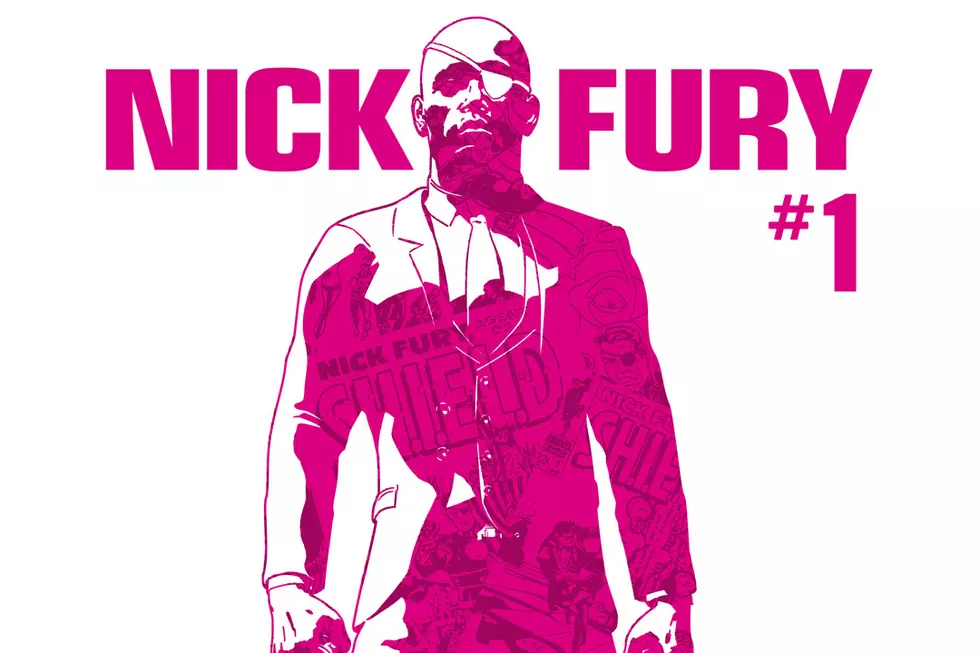![‘Amazing Spider-Man: Family Business’ Puts The ‘Spy’ In ‘Spider-Man’ [Review]](http://townsquare.media/site/622/files/2014/04/The-Amazing-Spider-Man-Family-business-main.png?w=980&q=75)
‘Amazing Spider-Man: Family Business’ Puts The ‘Spy’ In ‘Spider-Man’ [Review]
I have pretty strong feelings about Peter Parker's parents. To put them succinctly, I don't think they should matter. Peter's parents are dead, and that's that. Uncle Ben and Aunt May raised him, and they're the ones we should care about.
I say that to explain upfront that Amazing Spider-Man: Family Business, the new graphic novel by Mark Waid, James Robinson, Gabrielle Dell'Otto and Werther Dell'Edera was fighting an uphill battle with me from about the fifth page in. The story hinges quite a bit on Peter's family history, specifically on his parents' history as spies in the CIA. In the end, the team's charming mix of spies and Spidey mostly won me over, though not everything completely gels.
Let's get this out of the way first: The stuff with Peter's parents mostly just serves as a way to introduce a new character, Teresa, who claims to be Peter's long-lost sister, and as an excuse to put Spider-Man in the middle of a globe-trotting, James Bond-style spy adventure. By my reading, there were direct homages to Casino Royale (the book more than the movie) and perhaps an indirect homage to Skyfall. Peter even says outright that he's been invited to "be Jason Bourne."
That stuff is a ton of fun. Taking Spider-Man (and he does get ample opportunity to do superheroing) out of his traditional, streets-of-New-York setting and putting him in the familiar world of spy movies, with their casinos, safehouses, shady informants and car chases, makes for something pretty fresh. The art team of Dell'Otto and Dell'Edera seem to completely relish the settings, too. The seaside roads and old hotels that Peter and Teresa visit are wonderfully evocative of spy fiction, but stop short of pointing too directly at familiar settings from films past. They also depict Spidey in a very 1960s, Ditko-esque style that does even more to recall a certain era. What seems to be two very disparate genres end up blending together really well. (Dell'Otto has some experience melding spy fiction with superheroes, having been the artist on Secret War a decade ago.)
It also helps that Peter's quippy dialogue tends to be more good than bad, save for a few groaners here and there. There's one moment where Spidey attempts to speak French and it comes out as gibberish that is laugh-out-loud good.
That said, not all the dialogue hits exactly the right notes. This graphic novel is part of the line being launched to boost Marvel's efforts to really reach into the bookstore market, and there's a palpable sense that the writers and/or editors are holding readers' hands to explain who these characters are. Not all of the exposition is bad (the primer on Richard and Mary Parker's CIA history, which was first detailed in Untold Tales of Spider-Man #-1, would be welcome for even most comics fans), but lines such as the Kingpin's assertion, "I became too complacent as the head of all New York crime," are clunky as all get out. If the editors were worried about people not being familiar with the Kingpin -- and I'd contend most people who would buy this book, even in a bookstore, would be -- then a page of character bios in the front would have been more welcome than that shoehorned-in dialogue.
Another odd detail is that the end of this story seems a little rushed. Considering that this is a 112-page graphic novel that seemingly could add more pages if necessary, the reveal of the big plot twist and The Kingpin's big plan (I don't think I'm giving much away to say he's the villain of the piece, considering he's on the cover) are all dealt with and dispensed seemingly pretty quickly, and one factor that plays into it feels far too convenient. That said, Spider-Man fights a giant robot with Doctor Octopus arms in a big, climactic action sequence, and it looks fantastic.
I went back and counted the number of pages in what I'd call the book's final sequence, and it's nothing to scoff at -- it's about a full comic issue, page-wise. But the panel density per page is quite low. They max out at about five panels per page, and there are quite a few splash pages and big, two-page spreads. The painted art needs room to breathe, for sure, and it's served well by big panels and spreads, but it certainly has an effect on the pace of the storytelling, and it seems to suffer most at the very end.
So while The Amazing Spider-Man: Family Business definitely fits the description of a mixed bag, it also accomplishes what I think original graphic novels featuring superheroes ought to do, in that it tells a clever story with a cool hook that maybe wouldn't necessarily fly as an arc in a monthly comic (especially considering that Peter Parker has been off the playing field in continuity for the past little while), and is too niche and genre-specific to ever get off the ground as a movie. It finds a nice middle ground where it's self-contained but still deeply entrenched in the strange character twists you only get in comics.
More From ComicsAlliance


![The Odds Are Stacked And The Stakes Are High In ‘Nick Fury’ #1 [Preview]](http://townsquare.media/site/622/files/2017/03/Nick_Fury_1_Featured.png?w=980&q=75)

![The Blossom Twins And Pete Woods Wreak Havoc On Riverdale In ‘Archie’ #18 [Interview]](http://townsquare.media/site/622/files/2017/03/Archie00.jpg?w=980&q=75)

![At Last, It’s Dilton’s Turn To Shine In ‘Archie’ #16 [Preview]](http://townsquare.media/site/622/files/2017/01/Archie00.jpg?w=980&q=75)


